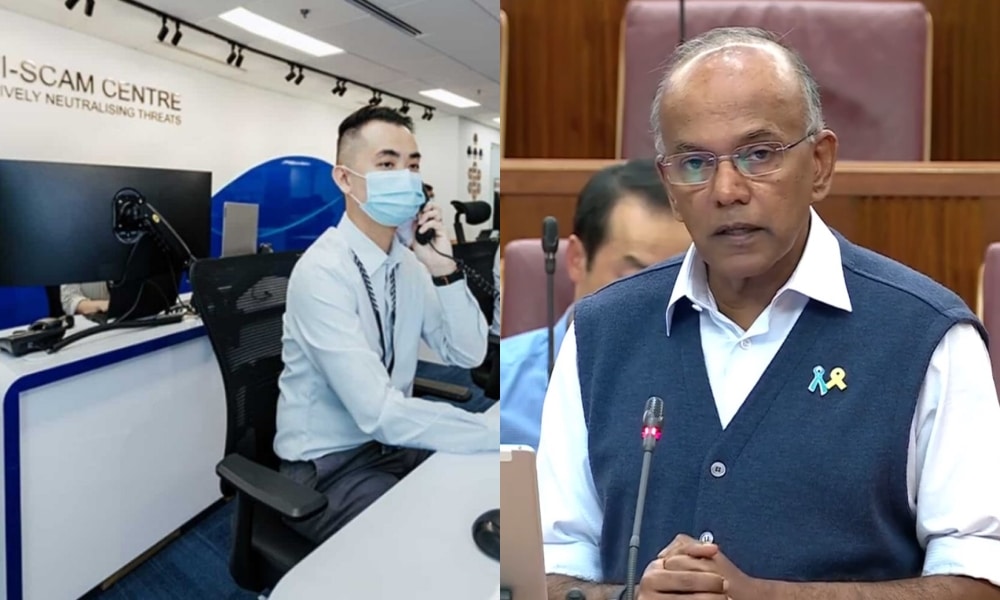Minister for Home Affairs K. Shanmugam emphasized that there is no “magic bullet or ironclad shield” in the prevention of scams.
During the debate on the Ministry of Home Affairs’ (MHA) budget, Mr Shanmugam outlined the ministry’s priorities for the upcoming year, which include addressing scams, addressing drug abuse among youths, and resource allocation for the Home Team.
While Singapore’s physical crime and drug situations are described as “relatively stable,” Shanmugam highlighted that scams were the primary contributor to crime in 2023.
In the past year alone, over 46,000 scam cases were reported, resulting in victims losing more than S$650 million. This marked a substantial 46.8 per cent increase from 2022.
To combat scams, the government collaborates with partners such as telecommunications companies and banks to enhance Singapore’s communications and banking channels, digital systems, and online platforms.
One notable initiative is the Police Anti-Scam Command (AsCom), which collaborates with over 100 partners from financial institutions and online platforms.
“Staffs from financial institutions are co-located with the AScom and that allows us to trace and freeze accounts quickly before they are gone, ” Minister Shanmugam added.
He also highlighted amendments to two key acts – the Corruption Drug Trafficking and other Serious Crimes Confiscation of Benefits Act (CDSA) and the Computer Misuse Act (CMA), aimed at making it easier to punish individuals involved in money mule activities and those abusing Singpass.
“MHA will also be introducing new laws next month to punish the abuse of local SIM cards for scams.”
While the government has taken legislative steps to combat scams, Minister Shanmugam acknowledged that there are limits to what the government can do.
“There isn’t a single magic bullet, an ironclad shield against scams,, unless we roll back digitalization which means no more internet shopping, no smartphones and social media, no internet banking, and that’s obviously not possible.”
Minister Shanmugam said the key line of defence against scams is every individual. People need to take responsibility for guarding themselves, their friends, and families against scams.
Ms Sun calls out Meta’s alleged reluctance to follow MHA’s anti-E-commerce scam recommendations
Minister of State for Home Affairs Sun Xueling, in her address, elaborated on government efforts to tackle scams and highlighted the recent expansion of this initiative to include Carousell staff.
Consequently, the time taken to remove online monikers associated with scams and suspicious advertisements on Carousell has been significantly reduced, from days to hours, as she informed the House.
Ms Sun emphasized the active engagement of the MHA and the police with various online platforms, particularly those prone to exploitation by scammers.
Despite the cooperation received from platforms like Carousell and Shopee, Ms Sun criticised Meta for consistently resisted MHA’s recommendations to combat e-commerce scams on Facebook.
The suggested safeguards by MHA involve verifying users through Government-issued IDs and providing a secure payment option for Marketplace users.
Notably, Meta products, including Facebook, WhatsApp, and Instagram, were identified as the leading online platforms exploited by scammers last year, contributing to 43 per cent of scam cases in 2023 and causing approximately $280 million in losses, as stated by Ms Sun.
“I urge meta to step up, to do right by your users, ” Ms Sun told the tech giant.
“One-stop portal” for anti-scam info and support
Ms. Sn unveiled plans for the launch of a government website later this year, which will serve as a comprehensive “one-stop portal” for anti-scam information and support.
The website will consolidate anti-scam resources, providing guidance on actions to take if someone suspects they have fallen victim to a scam.
Beyond offering advice on safeguarding against scams, the website will present current scam trends and offer information to victims on where to seek assistance.
For instance, volunteer victim care officers deployed by the police can address victims’ needs and guide them to community and professional resources for psychological and financial support.
Ms. Sun also revealed ongoing government studies on additional measures to enhance protection for unwitting members of the public, including those who may be in denial about falling victim to scams.
“(These victims) could be victims of love scams or investment scams where they have invested affection or significant amounts of monies, making it difficult for them to extract themselves from the situation,” she added.
Highlighting the 2023 statistics, Ms. Sun emphasized the need for further efforts in areas where Singapore showed vulnerabilities.
The surge in scams was attributed to social engineering and deception tactics, where individuals were duped into transferring money to fraudsters.
“As individuals, our ‘optimism bias’ leads us to mistakenly believe that we will not be deceived.”
“We may also let our guard down, making us vulnerable to our inherent human desire to be loved, to make an extra buck, to seize an attractive-looking offer. This is why even younger Singaporeans, who are generally more digitally savvy, fall prey to scams.”

